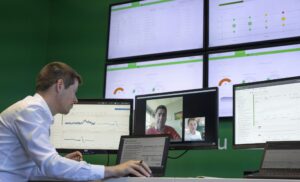IT environments aren’t what they used to be. You’d be hard-pressed to find an organization that runs its full IT infrastructure in a single location. With the advent of the Internet of Things (IoT) and edge computing, environments are increasingly distributed, crossing country borders and spanning multiple continents. Remote UPS management of these environments isn’t just a “nice to have,” it’s a must.
And the more granular the remote functionality is, the better. Managed service providers (MSPs) build their businesses on a remote services model, handling as many tasks from a central dashboard as possible to avoid expensive truck rolls to customer sites for every problem.
The model helps keep costs down for the IT provider and customer while improving availability and reliability. It is used to monitor networks, uninterruptible power supply (UPS) status, and perform remote tasks on computer and servers. Now, MSPs can leverage an even better approach to the The model helps keep costs down for the IT provider and customer while improving availability and reliability. It is used to monitor networks, uninterruptible power supply (UPS) status, and perform remote tasks on computer and servers. Now, MSPs can leverage an even better approach to the UPS management and oversight of IT infrastructure. Through single-device remote configuration, MSPs can get remote access to single devices within the backup power infrastructure for configuration, troubleshooting, and updating.
UPS management and oversight of IT infrastructure. Through single-device remote configuration, MSPs can get remote access to single devices within the backup power infrastructure for configuration, troubleshooting, and updating.

Single-device remote configuration overview
UPS management through single-device remote configuration is a game changer. It takes mass configuration to a granular level by making it possible to focus on just one device from anywhere. Now, when a provider receives an alarm from somewhere in the power infrastructure, it takes only a few clicks through a web-based dashboard to quickly identify the device and the problem. A few more clicks, and the problem is typically fixed. If necessary, an MSP can apply the configuration change to all similar devices across the environment.
Previously, this would have required using a VPN connection to access device settings or traveling to the site of the device, which is impractical with distributed environments spread over hundreds of miles. Either way, access would have to be coordinated with the customer. Whether physically entering a building or making a network connection, the provider would need to schedule an appointment and, based on the level of security in place, get authorization for access. It was a clunky, time-consuming approach that took hours or days to fix even a simple issue.
With single-device configuration, let’s say the provider receives an alarm of lost communication from an UPS or cooling unit. A few clicks later, an engineer can zoom in on the specific unit, view its settings, and determine what is causing the issue. The fix could be as simple as changing a network connection setting from “disabled” to “enabled.”
Or let’s say that while looking through device settings, an engineer discovers it is set to use the HTTP protocol for communication, which is far less secure than the encrypted HTTPS standard. Again, with a few quick clicks, the engineer can make the change remotely, and in doing so, potentially prevent a security breach of the client’s environment. As such, the remote configuration capability helps organizations protect their infrastructure from cyber threats by addressing issues before they can cause a problem.
How MSPs benefit from single-device remote configuration
MSPs are dealing with the management of increasingly complex and distributed IT environments. Innovations like single-device remote configuration enable MSPs to grow their business while also reducing costs. By proactively preventing downtime for customers, MSPs also strengthen their customer relationships and differentiate themselves from competitors.
Single-device remote configuration also helps address data center skills shortages. Qualified technicians are hard to come by, so anything that lets providers do more with less staff is always welcome. Single-device functionality also addresses a critical security need. It is important to look for a remote monitoring solution that issues regular updates through the cloud to address security vulnerabilities, which helps providers to keep their customer environments protected and up to date.
Learn more about remote monitoring and management solutions
IT remote monitoring and management platforms have become commonplace, not only for power management but also across the IT infrastructure. As environments become more and more spread out, single-device remote configuration gives MSPs another important tool to fill their customers’ IT and infrastructure service needs. Learn more about UPS management and single-device configuration capability, which is a significant step forward in preventing downtime through remote management.



